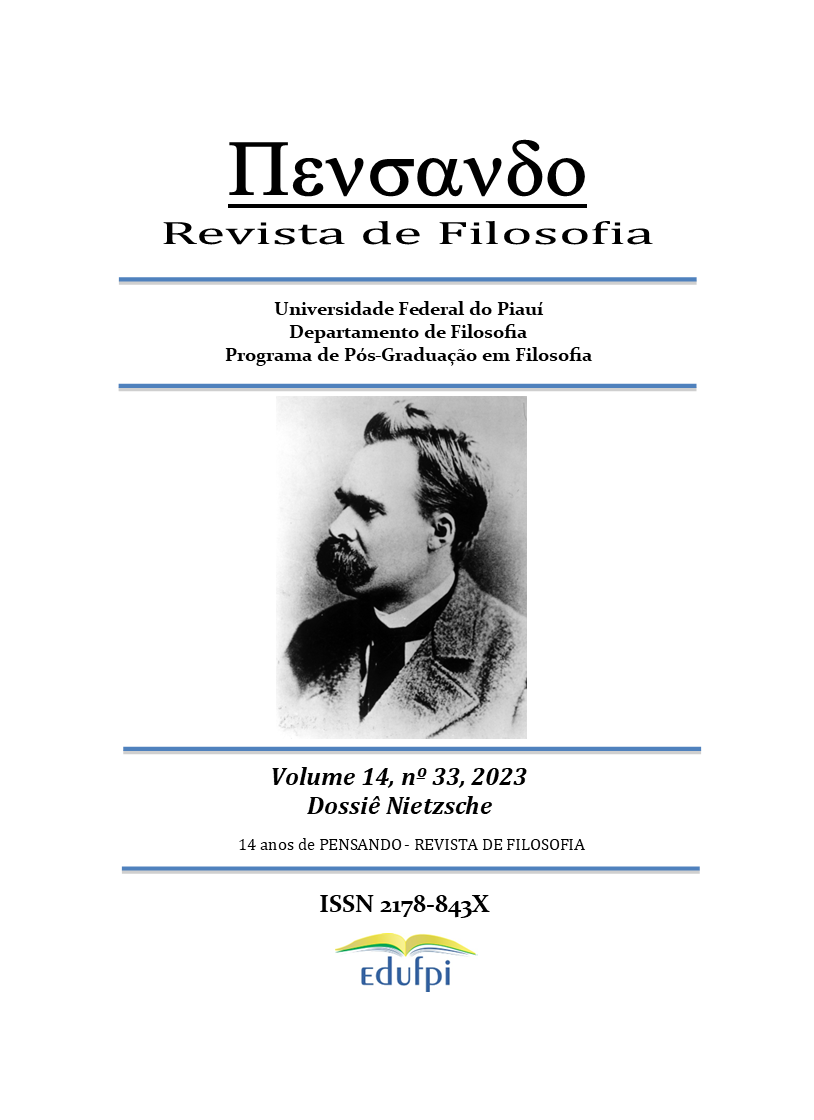ET IN ARCADIA NIETZSCHE
La natura eroico-idilliaca della Carmen e del Principe Vogelfrei
DOI:
https://doi.org/10.26694/pensando.vol14i33.4578Palabras clave:
Arcadia, Nature, Nietzsche, Poussin, Bizet, CarmenResumen
The essay focuses on the heroic-idyllic vision of nature presented by Nietzsche, working in an interdisciplinary way and starting from the motto Et in Arcadia Ego. What is Arcadia for Nietzsche, particularly in the early '80s, when he writes the Idylls from Messina? So, we will draw some threads, which will make us move between the idyllic paintings of Poussin and Bizet’s Carmen, rediscovering the sense of a Mediterranean nature (and of a Mediterranean South) in Nietzsche. In the final part of the essay, we will see how this scenario - far from being romantic or utopian - serves Nietzsche precisely for a strong geopolitical deconstruction, where the All-Natural opposes the barriers that divide the States in a nationalistic way and, therefore, the free spirit shows itself as the human to-come, beyond the personal and social individualism.
Citas
ADELUNG, Johann Christoph, Grammatisch-kritisches Wörterbuch der hochdeutschen Mundart, 4 Bde., Wien: P. B. Bauer, 1811.
BENNE, Christian, “Crux und Zeichen (‘Lied des Ziegenhirten. (An meinen Nachbar Theokrit von Syrakusă)’ / ‘Lied eines theokritischen Ziegenhirten.’”. In BENNE, Christian - ZITTEL, Christian, Nietzsche und die Lyrik, Stuttgart: J. B. Metzler, 2017, pp. 234-244.
BERLINGER, Rudolph, “Le paysage arcadien de Nietzsche: Reflets d'Engadine”. In Revue de Métaphysique et de Morale, N, 89, 4, 1984, pp. 490-504.
BRANDT, Reinhard, Filosofia nella pittura, tr. it. Milano: Mondadori, 2003.
BRESSANE, Julio, Dias de Nietzsche em Turin (film, 2001).
CAMPIONI, Giuliano et alii, Nietzsches persönliche Bibliothek, Berlin/London: de Gruyter, 2003.
CAMPIONI, Giuliano, ‘Gaya scienza’ e ‘gai saber’ nella filosofia di Nietzsche. In CARMASSI, Carlo, et alii, Dov’è il concetto? Studi in onore di E. De Angelis, München: Ludicius Verlag, pp. 33-51.
CRESCENZI, Luca, GENTILI, Carlo, Alla ricerca dei ‘buoni europei’. Riflessioni su Nietzsche, Bologna: Edizioni Pendragon, 2017.
CRESCENZI, Luca, Nietzsches Idyllen aus Messina. Das Volkslied als Form des Philosophierens. In SCHIRMER, Andreas, SCHMIDT, Rüdiger, Entdecken und Verraten. Zu Leben und Werk Friedrich Nietzsches, Weimar, 1999: Böhlaus Nachfolger, pp. 191-201.
DARRIULAT, Jacques, “Nietzsche. Et in Arcadia ego”, 1er septembre 2010: http://www.jdarriulat.net/Auteurs/Nietzsche/NietzscheArcadia.html.
D’IORIO, Paolo et alii, Nietzsche et l’Europe, Paris: Ed. de la Maison des Sciences de l’Homme, 2006.
D’IORIO, Paolo, “En marge de Carmen”. In Magazine Litteraire. N. 383, 2000, pp. 50-55.
D’IORIO, Paolo, “Nietzsche tra Tristano e Carmen”. In TATASCIORE, Carlo, Filosofia e musica, Milano: Mondadori, 2008.
DAFFNER, Hugo, Friedrich Nietzsches Randglossen zu Bizets Carmen, Regensburg: Gustav Bosse Verlag, 1912.
DAL BON, Bruno, La gioia sovrana. Nietzsche e la musica come filosofia, Milano: Mimesis, 2020.
DE SANTIAGO GUERVÓS, Luis Enrique, “Nietzsche y los ideales estéticos del sur. La necesidad de mediterraneizar la música”. In Analecta malacitana. Málaga. N. xxiii, 1, 2000.
DUFOUR, Éric, L’esthétique musicale de Nietzsche, Villeneuve d'Ascq: Presses Univ. du Septentrion, 2005.
GILMAN, Sander L., “Nietzsche and the Pastoral Metaphor”. In Comparative Literature. N. 26/4, 1974, pp. 289–298.
GORI, Pietro, STELLINO, Paolo, “Il buon europeo di Nietzsche oltre nichilismo e morale cristiana”. In Giornale Critico della Filosofia Italiana. Gennaio 2016, pp. 98-124.
GRIMM, Reinhold, “Antiquity as Echo and Disguise: Nietzsche’s ‘Lied eines theokritischen Ziegenhirte’, Heinrich Heine, and the Crucifed Dionysus”. In Nietzsche-Studien. N.14, 1985, pp. 201-249.
GRZELCZYK, Johan, “Nietzsche et le cas Bizet”. In Studia Nietzscheana, 2015: http://www.nietzschesource.org/SN/grzelczyk-2015;
ITODA, Soichiro, Nietzsches Idyllen aus Messina: Zu einer neuen kritischen Lektüre, in KAUFMANN, Sebastian et alii, Nietzsches Literaturen, Berlin-Boston: De Gruyter, 2019.
KAUFMANN, Sebastian, “Heiterkeit, Heroismus, Sentimentalität: Nietzsches Idyllen aus Messina und sein poetologisches Konzept der Idylle”, in KAUFMANN, Sebastian et alii, Nietzsche Als Dichter: Lyrik - Poetologie - Rezeption, De Gruyter, Berlin-Boston, pp. 95-120.
LÉVI-STRAUSS, Claude, Regarder, écouter, lire, Paris: Plon, 1993.
LISSON, Frank, “Der Einfluß Goethes auf die Lyrik Nietzsches”. In Nietzscheforschung, N. 3, 1995, pp. 207-217.
LORENZ, Martin, Die Metaphysik-Kritik in Nietzsche Carmen-Rezeption, Würzburg: Königshausen & Neumann, 2005.
MÜLLER, Renate G., “Idyllen aus Messina. Versuch einer Annäherung”. In Nietzscheforschung. N. 3, 1995, pp. 77-86.
NICODEMO, Nicola, Die moralische Aufgabe der ‘guten Europäer’ und die ‘zukünftigen Europäer’, in DIETZSCH, Steffen, Nietzsches Perspektiven. Denken und Dichten in der Moderne, Boston-Berlin: de Gruyter, 2014, pp. 385-406.
NIETZSCHE, Friedrich, Werke, Kritische Gesamtausgabe, a cura di G. Colli e M. Montinari, Berlin-New York: Walter de Gruyter, 1972, tr. it. Opere e Epistolario, Milano: Adelphi, 1964 sgg.
PANOFSKY, Erwin Et in Arcadia ego: Poussin and the Elegiac Tradition, in Philosophy and History: Essays Presented to Ernst Cassirer, ed. by Raymond Klibansky and H. J. Paton, Oxford University Press, 1936, pp. 295-320.
PIAZZESI, Chiara et alii, Letture della Gaia scienza, Pisa: ETS, 2010.
PRANGE, Martine, Nietzsche, Wagner, Europe, Berlin/London: De Gruyter, 2013.
PRANGE, Martine, Valuation and Revaluation of the Idyll. Schillerian Traces in Nietzsche's Early Musical Aesthetics, in RESCHKE, Renate et alii, F. Nietzsche – zwischen Musik, Philosophie und Ressentiment, Akademie Verlag, 2006, pp. 269-278.
ROOS, Richard, “Nietzsche et Epicure: l’idylle héroïque”. In WOTLING, Patrick, BALAUDÉ, Jean-François, Lectures de Nietzsche, sous la dir. de Balaudé et Wotling, Livre de Poche, 2000, pp. 282-350.
RUIZ, Antonio Notario, “Faut-il encore méditerraniser la musique?”. In Pliegos de Yuste. N. 13.14, 2011 - 2012, pp.107-116.
SCHULZE, Ingrid, Nietzsche und Claude Lorrain. In Nietzscheforschung. N. 4, 1998, pp. 217–225.
SHAPIRO, Gary, Archeologies of Vision, Foucault and Nietzsche on Seeing and Saying, Chicago/London: The University of Chicago Press, 2003.
TEOCRITO, Idilli ed epigrammi, a cura di Massimo Rossi, testo greco a fronte, Milano: La Vita Felice, 2020.
UHLAND, Ludwig, Schriften zur Geschichte der Dichtung und Sage. Abhandlung über die Deutschen Volkslieder, hrsg. von PFEIFFER, Franz, Stuttgart, 1866 sgg.
VIVARELLI, Vivetta, La notte del Tristano e la mezzanotte di Zarathustra tra Wagner e Bizet, in GRILLI, Alessandro et alii, Interpretazioni: studi in onore di Guido Paduano, Pisa: Pisa University press, 2019.
WITZLER, Ralf, Europa im Denken Nietzsches, Würzburg: Königshausen & Neumann 2001.
Publicado
Cómo citar
Número
Sección
Licencia
Derechos de autor 2023 PENSANDO - REVISTA DE FILOSOFIA

Esta obra está bajo una licencia internacional Creative Commons Atribución 4.0.

























